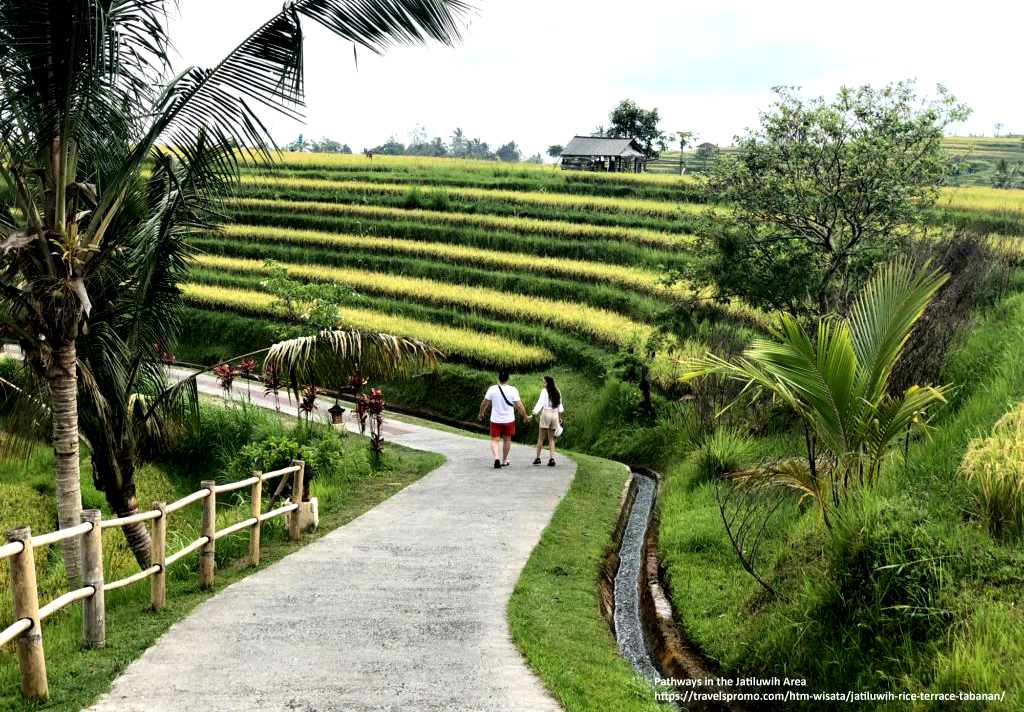The Sustainability of Paddy Field Tourism: Problems and Control Instruments
DOI:
https://doi.org/10.31292/mj.v1i2.11Keywords:
Sustainability, Spatial Planning, Land, Incentive-DisincentiveAbstract
The growing paddy field tourism trend cannot be separated from the shift in tourist interest towards agritourism. Paddy field tourism is seen as having positive roles. Among others, it can improve the quality of life of farmers, provide educational facilities for tourists, and maintain the indigenous culture of the community. These things indicate the need for efforts to maintain its sustainability. However, recent data show that some paddy fields are beginning to experience physical degradation caused by pressure from tourism activities and developments. This is feared to threaten the sustainability of paddy field tourism. Therefore, it is necessary to imme¬diately take steps to control the spatial use to ensure its sustainability in the future. This study aims to provide suggestions in the form of control instru¬ments for the spatial use and strategies for implementing these instruments in order to support the sustainability of paddy field tourism. The method used was library research with qualitative analysis techniques. The results showed that the incentive-disincentive control instrument met the criteria to support the sustainability of paddy field tourism. However, to support its effectiveness, the strategy of implementing the instrument should be carried out by synergizing spatial planning substance with land data.
Downloads
References
Arifianto, E.Y., Susenohaji, Dinanti, D., Damaris, D., & Luxfianti, D. (2014). Strategi Pengembangan Industri Wisata Era New Normal. Prosiding Seminar Nasional Ekonomi dan Bisnis 2021 Universitas Muhammadiyah Jember. https://doi.org/10.32528/psneb.v0i0.5164
Budi Purwoko, & Rani Kusuma. (2018). Studi Kepustakaan Mengenai Landasan Teori Dan Praktik Konseling Neuro Linguistic Programming (NLP). Jurnal BK UNESA, 8(1).
Busby, G., & Rendle, S. (2000). The transition from tourism on farms to farm tourism. Tourism Management, 21(6). https://doi.org/10.1016/S0261-5177(00)00011-X
DetikTravel. (2021, Februari). Aneka Wisata Tengah Sawah di Jawa Tengah dan Yogyakarta. Diakses tanggal 12 Februari 2022 dari https://travel.detik.com/domestic-destination/d-5371852/aneka-wisata-tengah-sawah-di-jawa-tengah-dan-yogyakarta
Handayani, S. (2016). Agrowisata Berbasis Usahatani Padi Sawah Tradisional Sebagai Edukasi Pertanian (Studi Kasus Desa Wisata Pentingsari). HABITAT, 27(3). https://doi.org/10.21776/ub.habitat.2016.027.3.15
Lan, N. T. P., & Chau, H. N. M. (2020). Collaboration in agrotourism development: The role of local government in Yeongdong County, Chungcheongbuk Province, Korea. Journal of People, Plants, and Environment, 23(6). https://doi.org/10.11628/ksppe.2020.23.6.589
Lanya, I., Subadiyasa, N., Sardiana, K., & Ratna Adi, G. P. (2018). Planning of Agro-Tourism Development, Specific Location in Green Open Space Sarbagita Area, Bali Province. IOP Conference Series: Earth and Environmental Science, 123(1). https://doi.org/10.1088/1755-1315/123/1/012038
Latifah, Eva. (2021, Maret). Rekomendasi Wisata Sawah di Indonesia, Bikin Sejuk Pikiran. Diakses tanggal 11 Februari 2022 dari https://www.harapanrakyat.com/2021/03/rekomendasi-wisata-sawah-di-indonesia/
Maulidi, C., & Wulandari, L. D. (2017). Changing cultural landscape in post-productivism of rice field in Nyuh Kuning Village Bali. IOP Conference Series: Earth and Environmental Science, 70(1). https://doi.org/10.1088/1755-1315/70/1/012049
Mulya Handayani, S., Jamhari, Rahayu Waluyati, L., & Handoyo Mulyo, J. (2020). Consumer Satisfaction on Wetland Rice Agro-Tourism in Daerah Istimewa Yogyakarta (DIY). IOP Conference Series: Earth and Environmental Science, 518(1). https://doi.org/10.1088/1755-1315/518/1/012061
Nisa, A.R.K., Samino, S., & Arisoesilaningsih, E. (2014). Agroedutourism and Ecopreneurship Activities on the Organic Farming Practices in Lawang, Malang Regency, East Java, Indonesia. Journal of Indonesian Tourism and Development Studies, 2(3). https://doi.org/10.21776/ub.jitode.2014.002.03.03
Oka Prasiasa, D. P., & Sri Widari, D. A. D. (2019). Traditional Agricultural System as Tourism Icon in Jatiluwih Tourism Village, Tabanan Regency, Bali Province. Journal of Asian Development, 5(2). https://doi.org/10.5296/jad.v5i2.14585
Pleger, L. E., Lutz, P., & Sager, F. (2018). Public acceptance of incentive-based spatial planning policies: A framing experiment. Land Use Policy, 73. https://doi.org/10.1016/j.landusepol.2018.01.022
Pramesti, I. G. A. A., Putra, G. B. B., & Yuesti, A. (2020). The Role of Agrotourism in Sustainable Tourism Development in Bali Province. Proceeding 1st International Conference of Innovation on Science and Technology (ICISTSD), 1(1).
Rahmi, D. H., & Setiawan, B. (2020). Pressures on the Balinese world cultural landscape heritage: The case of Jatiluwih Subak Village. IOP Conference Series: Earth and Environmental Science, 501(1). https://doi.org/10.1088/1755-1315/501/1/012032
Rosardi, R. G., Prajanti, S. D. W., Atmaja, H. T., & Juhadi. (2021). Sustainable tourism model in pagilaran tea plantation agrotourism, in Indonesia. International Journal of Sustainable Development and Planning, 16(5). https://doi.org/10.18280/ijsdp.160519
Sari, M., & Asmendri. (2018). Penelitian Kepustakaan (Library Research) dalam Penelitian Pendidikan IPA. Penelitian Kepustakaan (Library Research) Dalam Penelitian Pendidikan IPA, 2(1).
Satriawati, Z., Ingkadijaya, R., & Sulartiningrum, S. (2019). Strategy Analysis of Ponggok Rural Tourism Development into Integrated Tourism Area. TRJ Tourism Research Journal, 3(1). https://doi.org/10.30647/trj.v3i1.44
Scandiffio, A. (2021). Mapping flooded paddy-rice fields in the landscape between Turin and Milan: A GIS-based method for detecting scenic routes for experiential tourism. GI_Forum, 9(1). https://doi.org/10.1553/GISCIENCE2021_01_S169
Setiawan, I. K. (2019). Kebertahanan Subak di Desa Kedewatan Ubud, di Tengah-Tengah Arus Pariwisata Global. Pustaka: Jurnal Ilmu-Ilmu Budaya, 19(2). https://doi.org/10.24843/pjiib.2019.v19.i02.p08
Songkhla, T. N. (2012). Impact of Agro-Tourism on Local Agricultural Occupation: A Case Study of Chang Klang District, Southern Thailand. ASEAN Journal on Hospitality and Tourism, 11(2). https://doi.org/10.5614/ajht.2012.11.2.03
Sudrajat. (2015). Mengenal Lahan Sawah dan Memahami Multifungsinya Bagi Manusia dan Lingkungan. Yogyakarta: Gadjah Mada University Press.
Sumarja, Rifai, E., Tisnanta, dan Saputra, R.A. (2021). Problematika Perlindungan Lahan Pertanian Berkelanjutan Pasca Undang-Undang Cipta Kerja. SASI, 27(4), 492-503. DOI: https://doi.org/10.47268/sasi.v27i4.562
Syahadat, R. M., Putra, P. T., Saleh, I., Patih, T., Sagala, A. R., & Thoifur, D. M. (2021). Visual quality protection of ciboer rice fields to maintain the attraction of Bantar Agung tourism village. Agraris, 7(1). https://doi.org/10.18196/AGRARIS.V7I1.6960
Tiraieyari, N., & Hamzah, A. (2011). Agri-tourism: Potential opportunities for farmers and local communities in Malaysia. In African Journal of Agricultural Research (Vol. 6, Issue 31). https://doi.org/10.5897/AJARx11.035
Trisna, I. M., David, I. P., & Saputra, A. (2015). Dampak pengembangan destinasi pariwisata terhadap alih fungsi lahan sawah. Ilmiah Hospitality Management, 6(1).
Wang, N., Li, J., & Zhou, Z. (2021). Landscape pattern optimization approach to protect rice terrace Agroecosystem: Case of GIAHS site Jiache Valley, Guizhou, southwest China. Ecological Indicators, 129. https://doi.org/10.1016/j.ecolind.2021.107958
Widia, I. K. (2018). Local Law-Based Rice Field Maintenance to Support Tourism Industry. https://doi.org/10.2991/icblt-18.2018.5
Windia, W., Suamba, I. K., Sumiyati, S., & Tika, W. (2018). Sistem Subak untuk Pengembangan Lingkungan yang Berlandaskan Tri Hita Karana. SOCA: Jurnal Sosial Ekonomi Pertanian. https://doi.org/10.24843/soca.2018.v12.i01.p10
Yamagishi, K., Gantalao, C., & Ocampo, L. (2021). The future of farm tourism in the Philippines: challenges, strategies and insights. Journal of Tourism Futures. https://doi.org/10.1108/JTF-06-2020-0101
Zed, M. (2008), Metode Penelitian Kepustakaan. Jakarta: Yayasan Obor.
Zhang, L., & Stewart, W. (2017). Sustainable Tourism Development of Landscape Heritage in a Rural Community: A Case Study of Azheke Village at China Hani Rice Terraces. Built Heritage, 1(4). https://doi.org/10.1186/bf03545656

Downloads
Published
How to Cite
Issue
Section
License
Copyright (c) 2022 Novita Dian Lestari

This work is licensed under a Creative Commons Attribution-ShareAlike 4.0 International License.

















